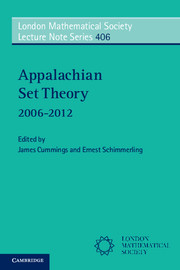Book contents
- Frontmatter
- Contents
- Contributors
- Introduction
- 1 An introduction to ℙmax forcing
- 2 Countable Borel equivalence relations
- 3 Set theory and operator algebras
- 4 A tutorial on Set Mapping Reflection
- 5 An introduction to hyperlinear and sofic groups
- 6 Aronszajn trees and the SCH
- 7 Iterated forcing and the Continuum Hypothesis
- 8 Short extender forcing
- 9 The complexity of classi?cation problems in ergodic theory
- 10 On the strengths and weaknesses of weak squares
- 11 Proper forcing remastered
- 12 Set theory and von Neumann algebras
- 13 The HOD Dichotomy
10 - On the strengths and weaknesses of weak squares
Published online by Cambridge University Press: 05 December 2012
- Frontmatter
- Contents
- Contributors
- Introduction
- 1 An introduction to ℙmax forcing
- 2 Countable Borel equivalence relations
- 3 Set theory and operator algebras
- 4 A tutorial on Set Mapping Reflection
- 5 An introduction to hyperlinear and sofic groups
- 6 Aronszajn trees and the SCH
- 7 Iterated forcing and the Continuum Hypothesis
- 8 Short extender forcing
- 9 The complexity of classi?cation problems in ergodic theory
- 10 On the strengths and weaknesses of weak squares
- 11 Proper forcing remastered
- 12 Set theory and von Neumann algebras
- 13 The HOD Dichotomy
Summary
The thirteenth Appalachian Set Theory workshop was held at Carnegie Mellon University in Pittsburgh on March 19, 2011. The lecturer was Menachem Magidor. As a graduate student Chris Lambie-Hanson assisted in writing this chapter, which is based on the workshop lectures.
Introduction
The term “square” refers not just to one but to an entire family of combinatorial principles. The strongest is denoted by “◻” or by “Global ◻,” and there are many interesting weakenings of this notion. Before introducing any particular square principle, we provide some motivating applications. In this section, the term “square” will serve as a generic term for “some particular square principle.”
Jensen introduced square principles based on work regarding the fine structure of L. In his first application, he showed that, in L, there exist κ-Suslin trees for every uncountable cardinal κ that is not weakly compact.
Let T be a countable theory with a distinguished predicate R. A model of T is said to be of type (λ, μ) if the cardinality of the model is λ and the cardinality of the model's interpretation of R is μ. For cardinals α, β, γ and δ, (α, β) → (γ, δ) is the assertion that for every countable theory T, if T has a model of type (α, β), then it has a model of type (γ, δ). Chang showed that under GCH, (ℵ1, ℵ0) → (κ+, κ) holds for every regular cardinal κ. […]
- Type
- Chapter
- Information
- Appalachian Set Theory2006–2012, pp. 301 - 330Publisher: Cambridge University PressPrint publication year: 2012
- 5
- Cited by



